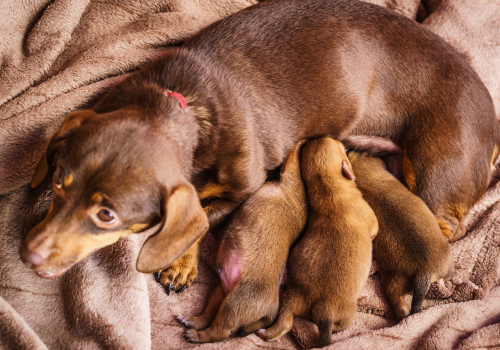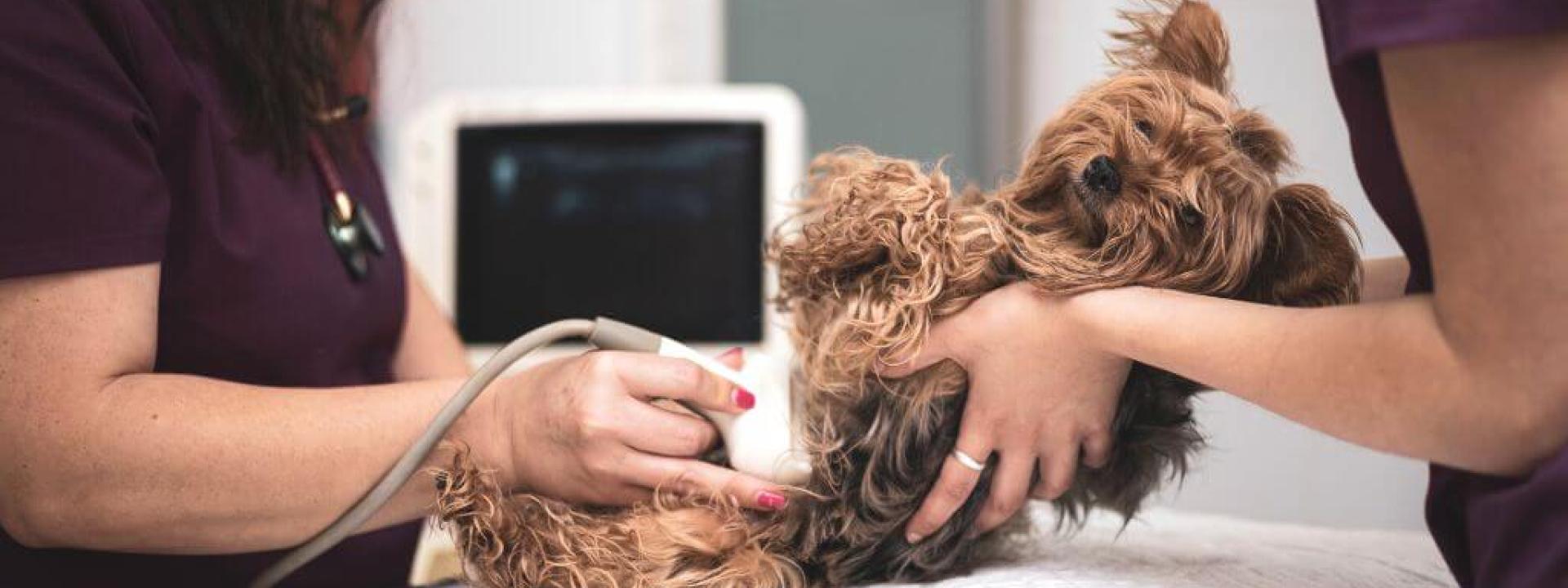Dog pregnancy can be both an exciting time for dog owners and also one of anticipation and worry. There are many factors to consider and several potential issues to watch for, from ensuring your dog's health before breeding to preparing a quiet space for whelping. If you're interested in breeding your dog, you might have been tempted to turn to Google for insight. At Veterinary Medical Center, we work extremely hard to bring you the accurate information you need. To avoid the misinformation you can stumble across online, we've answered the most frequently asked questions about dog pregnancy as thoroughly and accurately as possible to ensure you have the facts about such a critical topic.
If you're looking for a highly trained veterinarian in Union City, CA, we'd love to see your dog for an exam before breeding or to confirm pregnancy, so please call us at (510) 441-8500.
How can I ensure the wellbeing of my pregnant dog?
The key to ensuring your dog's wellbeing through pregnancy is first to confirm she's in good general health before becoming pregnant. If you plan to breed your dog, ensure she's examined by your veterinarian beforehand. As step one in the process, she needs to be confirmed as healthy and, therefore, able to withstand the rigors of pregnancy.
Step two is to consider testing for any infectious diseases, such as brucellosis, to ensure she's a good pregnancy candidate and has nothing contagious that she could pass along to the male or their puppies.
The third and final step is to get parasite screening. Certain intestinal worms can be transferred placentally, or after birth to the puppies, so you want to ensure she's cleared of any worms beforehand. These steps make for a smoother birthing process and a more manageable first few weeks of the puppies' lives with a healthy mother.

How long will my dog be pregnant?
The gestation period for dogs is approximately 63 days or 21 days per trimester.
How soon should I bring my dog in to see a veterinarian if I suspect she is pregnant?
The beginning stages of dog pregnancy can be hit or miss since she just came out of heat. Sometimes when dogs are coming out of heat, they can experience a false pregnancy that mimics an actual pregnancy. Other times, hormonal changes can fool you. That being said, you should bring her to see your veterinarian at approximately three weeks if you suspect she's pregnant. Before then, there's not much definitive testing your veterinarian can do to confirm pregnancy.
Only one good test uses a hormone called Relaxin to detect pregnancy, which is released in the first 21 to 27 days after breeding. After 30 days, if your dog is pregnant, they should have the Relaxin hormone present. That's about the earliest you can definitively confirm a dog pregnancy.
What are some signs of pregnancy in dogs?
The very early stages of pregnancy are tricky, but as pregnancy progresses into the second or early third trimester, you'll start to see some visible changes in your dog.
Signs of pregnancy in dogs include:
- Enlarged and engorged mammary glands that produce milk
- Swollen vulva
- Abdominal swelling at 30-40 days
- Nesting behavior
- Irritability
- Tires easily

Will my veterinarian use diagnostic testing to determine if my dog is pregnant?
The Relaxin pregnancy test is used more often than diagnostic testing to confirm pregnancy. However, your veterinarian can take x-rays of the dog's abdomen to confirm pregnancy, giving you an estimated puppy count. X-rays cannot be used until later in the pregnancy, as the puppies' skeletons don't ossify until around day 50. You might not see bone to confirm puppies or estimate the count if done before then.
Your veterinarian can also conduct an ultrasound, which is mainly used to confirm the viability of the pregnancy — but is a challenging way to count puppies. If you have a litter of 10 or 12 puppies, it will be difficult to count those in an ultrasound. However, you can tell the viability of the pregnancy, confirming the puppies' heart rates and other markers.
What are some possible complications of dog pregnancy that I should be aware of?
While most dog pregnancies are smooth and without issue, there can be some complications along the way. It's essential to monitor your dog closely during pregnancy and immediately after giving birth to catch any early issues.
Possible complications of dog pregnancy include:
- Excessive milk production, requiring calcium supplementation or increased calories
- Gestational diabetes
- Retained placenta, leading to uterine infection
- Mastitis, a bacterial infection of the mammary glands
- Uterine infections
What are some things I can do at home to prepare for my dog's labor?
Consider setting up a whelping box or whelping pen, which is a spot where your dog can go away from the noise and chaos of home and labor by themselves. This should be an area that is well-padded, warm, and preferably dark. Your dog will want to give birth by themselves, so provide a space that allows for that. Depending on the size of your dog, you can use a kiddie pool with blankets or towels to cushion it. Sometimes it's as simple as a cardboard box hidden in your closet, which works well for smaller-sized dogs. Have plenty of towels available, and when it gets closer to the whelping time, have those towels ready with warm water. Also, be prepared to keep the puppies warm.
The American Kennel Club offers a whelping supply checklist, including everything from newspapers to heat lamps.
How can I help my dog recover after giving birth?
After your dog gives birth, let Mother Nature take its course. Your dog instinctively knows what to do, so try not to intervene unless forced due to an issue or emergency. Only aid your dog with delivering the puppies if one is stuck or in distress, at which time you should call your veterinarian.
Regarding veterinary intervention, that might be necessary if she's been pushing for 30 minutes or more and nothing is happening. If she's taking longer than 3-4 hours between puppies, that can also indicate a potential problem. If you see that a puppy passed, but no placenta follows, be mindful of that and make sure the placenta eventually passes.
When your dog's maternal instincts kick in, she will clean the puppies. She will likely eat the placenta and, by doing that, will take care of snipping the umbilical cord herself while chewing the placenta off. While it seems hard to imagine, this is normal, and dogs usually do a pretty good job with it. If your dog has maternal behavior problems, such as not letting her pups nurse or cleaning her pups, call your veterinarian immediately.
If you have further questions about dog pregnancy, contact your veterinarian. If you live in or near Union City, CA, we'd love to see your dog for an exam before breeding, so please don't hesitate to call us at (510) 441-8500 or email us at [email protected].

